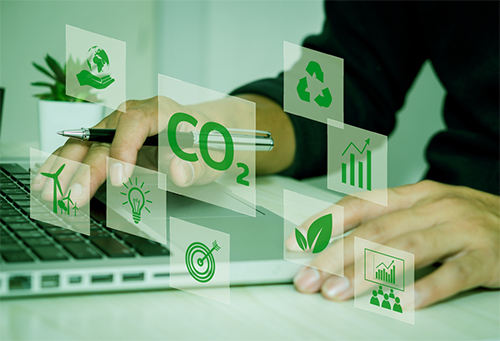 Connect with us
Connect with us

 Apr 02, 2024
Apr 02, 2024
Excellencies, esteemed members of the Institute of Directors, distinguished guests, visionaries of the business world, ladies and gentlemen, a very good morning to all of you.
Today, I stand before you here to discuss a theme that resonates deeply with each one of us: 'Creating a Future-Ready Business in an Uncertain World.'
In an era defined by rapid technological advancements, geopolitical shifts, and unprecedented challenges from pandemics to climate change uncertainty has become our constant companion. It is a natural inclination for people to perceive uncertainty as undesirable. Those who consider uncertain and unknown outcomes as something to be avoided may find it difficult to enter the doorway of growth and opportunity. On the other hand, within this uncertainty lies immense opportunity. In embracing a visionary perspective, we unveil a world brimming with potential and opportunity an opportunity to innovate, to transform, and to lead with resilience.
Nassim Nicholas Taleb, in his thought-provoking book “Antifragile: Things That Gain from Disorder,” argues that in order for individuals, institutions, industries, and societies to not only survive but also thrive, it is essential to make peace with uncertainty. So, how do we navigate this uncertain world and create businesses that are not just surviving but also thriving? How do we ensure our businesses are robust and ready for the future?
(1.) Embrace agility and innovation: First and foremost, future-ready businesses are agile. They adapt to changes swiftly and innovate constantly. The digital transformation that once took years now unfolds in months. As leaders, we must foster a culture of innovation, where trial and error are encouraged, and failure is seen as a step towards success.
(2.) Invest in people and talent: The heart of any organisation is its people. Investing in talent - nurturing their skills, fostering their growth, and ensuring their well-being is pivotal. The future belongs to organisations that empower their employees, embrace diversity, and cultivate leadership at every level.
(3.) Technology and data: Data is the currency of the future, with technology serving as its backbone. Investing in cutting-edge technology and harnessing the power of data analytics will enable us to make informed decisions, predict trends, and personalize experiences. Yet, as we venture into the digital frontier, let us also prioritize cybersecurity and data privacy, guarding our stakeholders' trust as zealously as we do our assets.
(4.) Sustainability: Sustainability is no longer a buzzword but a business imperative. The leaders of tomorrow are those who integrate environmental, social, and governance (ESG) principles into the core of their business strategy. Our pursuit of profit must align with the planet's well-being and societal progress.
Today, I would like to focus on environmental sustainability
I would like to briefly present the magnitude of the problem, the current solutions, and what we do at Granules India.
As per the latest World Economic Forum Global Risk Report 2024, climate change and environmental risks could hit the point of no return in the coming decade, which is the biggest risk facing humankind and occupies the top 4 of the 10 risks for the coming decade. In 2023, we witnessed various displays of climate induced extreme weather events surge in frequency, intensity, and impact across the globe. UN Secretary-General António Guterres starkly proclaimed that we have transcended beyond the phase of global warming and are now confronted with what he has termed 'the era of global boiling.'
The initial climate data from 2024 paints a gloomy picture, with global sea surface temperatures as well as surface air temperatures in February 2024 in record territory and at the hottest ever level.
The ice cover in North America's Great Lakes, the largest source of surface fresh water, has hit its lowest level in 50 years. Climate change and global warming could have catastrophic results for the Himalayan Glacier System that could lose up to 80% of their volume if global warming isn't controlled. Ice and snow in the Hindu Kush Himalayan ranges are an important source of water, and the availability of fresh water could be curtailed for nearly 2 billion people who live downstream of 12 rivers that originate in the mountains and flow through 16 countries in Asia.
In an era defined by rapid technological advancements, geopolitical shifts, and unprecedented challenges from pandemics to climate change uncertainty has become our constant companion. Within this uncertainty lies immense opportunity. In embracing a visionary perspective, we unveil a world brimming with potential and opportunity-an opportunity to innovate, to transform, and to lead with resilience.
We are at a pivotal juncture. The time for debate has passed. The time for decisive, collective action is now. The decisions we make and the actions we take – or fail to take – will echo through generations.
The global community has come to a consensus – from COP meetings in Paris in 2016 to recently concluded COP 28 at Dubai - that we must together limit the global warming to 1.5˚C. The global coalition committed to this cause is expanding, and a transition to clean energy is well underway. This is truly reflected in UAE consensus arrived at COP 28, appealing for accelerating energy transition and renewable adoption.
In today's energy landscape, wind and solar power have clearly emerged as the most cost-effective new sources of electricity in many markets. Importantly, the solar capacity is projected to grow ahead of additional energy demand. On the battery cost front- cost of lithium iron phosphate (LFP) batteries have been coming down more than considered realistic just a short while ago, a great boost to the EV segment. The surge in electric vehicle sales is breaking records, signifying a shift in consumer behavior and industry focus. EV adoption is now headed towards 20%. These are all very encouraging signs.
However, it's time to shift orbit and move beyond clean electricity generation and sustainable transportation, and bring focus on industrial processes. Rapidly decarbonizing industries, especially those producing materials and chemicals, is essential. This effort is a key part of the transition from 'brown' to 'green' technologies.
We need to step up innovation in the areas of green hydrogen, Electrolyzer technology, grid level battery storage solutions and advancements in Carbon Capture, Utilization, and Storage (CCUS) to name a few.

Today, I want to bring your attention to the pharmaceutical sector and Granules efforts towards decarbonisation.
The carbon footprint of pharmaceutical industry is estimated at 260 million tons of CO equivalent and is 2 growing at 15%.
Industry uses fossil fuel-based materials intensively both as source of energy and as a feedstock. The most important characteristic is that more than 80% of the emissions are in the supply chain.
There are three pillars on which the decarbonization efforts could be based.
(1.) Green molecules based on green power, water, and air.
(2.) Efficient method of synthesis based on bio catalysis and flow technology.
(3.) Breakthrough in formulation manufacturing avoiding solvents, polymers and reducing water usage.
On the green molecule front, our latest venture, Granules CZRO, is going to produce medicines with a near-net-zero carbon footprint. We are bringing together integrated green energy and green molecule platforms for pharmaceutical manufacturing with built-in circularity. The platform utilizes renewable energy, a pump hydro - storage battery, electrolyzer technology to synthesize 2 green H green ammonia, and a few other basic chemicals like nitric acid, and subsequently the key starting material as required for medicine.
This integrated platform will start with the two largest molecules that the world uses: paracetamol for pain management and metformin for diabetes management. In addition to the green molecules initiative through CZRO, we are embracing green science and principles of green chemistry such as biocatalysis and continuous manufacturing such as flow technology. We are also institutionalizing this in the form of a green score at every stage of manufacturing. The formulation stage of converting API into tablets or formulating into injectables or liquids has a significant environmental impact with solvents, excipients, and plastics.
In this journey, we are also collaborating with premier academic institutions such as NIPER, the leading pharmaceutical academic institution in India, to come up with innovative and sustainable practices in polymer- and solvent-free pharmaceuticals as well as plant-based excipients. This is how we at Granules are redefining pharmaceutical manufacturing and getting to maximum efficiency and minimum carbon. That's Granule's approach to realizing our purpose of healing lives responsibly through pioneering green science.
Thankyou!

Bringing a Silent Revolution through the Boardroom
Institute of Directors (IOD) is an apex national association of Corporate Directors under the India's 'Societies Registration Act XXI of 1860'. Currently it is associated with over 30,000 senior executives from Govt, PSU and Private organizations of India and abroad.
Owned by: Institute of Directors, India
Disclaimer: The opinions expressed in the articles/ stories are the personal opinions of the author. IOD/ Editor is not responsible for the accuracy, completeness, suitability, or validity of any information in those articles. The information, facts or opinions expressed in the articles/ speeches do not reflect the views of IOD/ Editor and IOD/ Editor does not assume any responsibility or liability for the same.
About Publisher

Bringing a Silent Revolution through the Boardroom
Institute of Directors (IOD) is an apex national association of Corporate Directors under the India's 'Societies Registration Act XXI of 1860'. Currently it is associated with over 30,000 senior executives from Govt, PSU and Private organizations of India and abroad.
View All BlogsMasterclass for Directors
Categories